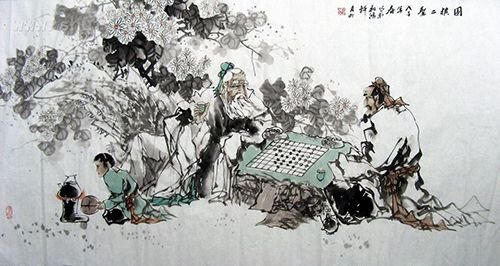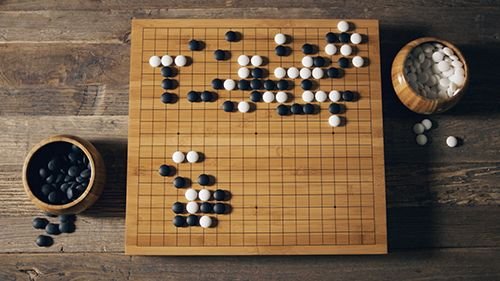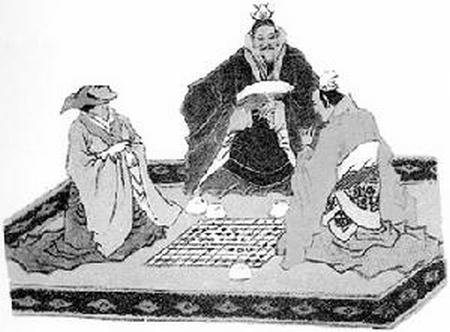Dear Steemit friends:

In my last post about idioms, I introduced the Chinese idiom "Fine feathers make fine birds". I'm sure many of you will remember the story of the lost girl who experienced vastly different treatment based on her appearance. Of course, this was just an experiment and the little girl lived happily ever after but it is a sad reflection of today's society where first impressions determine so many aspects of our lives. As they say, never judge a book by it's cover. If you missed that post, you can read it here. Today, we'll be looking at the idiom "Qi Feng Dui Shou - 棋逢对手". Don't go anywhere, let's take a look!
Today's Chinese Idiom story —— Diamond cuts diamonds
Qi Feng Dui Shou - 棋逢对手, is an ancient proverb and yet it is so applicable in the modern day. When translated to English, it's actually quite a bit of fun. Diamond cutting diamonds? That's right! It means to meet force with force. However, in Chinese, Qi Feng Dui Shou is used to describe fierce competition or a very evenly fought battle, once which cannot easily discern the winner from the loser. In English, it also means "To meet ones match".

Origins of the Idiom
When Chinese people use this idiom, they will automatically think of the ancient table top board game called "Go". The ancient name for this game was actually called "Yi" whilst the western nomenclature has adopted the name "Go". The earliest written accounts of people playing Go can be traced all the way back to the Warring states period between 475 and 221 BC. It was only until the Sui and Tang dynasties that the game made it's way to Japan and other western countries.

The game of Go is quite simple, and yet it offers almost infinite complexity. Players will each take turns placing a stone on the board (where the lines intersect), black goes first. The aim is to try and take up as much territory as possible whilst also taking prisoners. Prisoners are taken by fully surrounding your opponents stones, in which case the opponents stones are removed and held as prisoners. At the end, the players count up the vacant points inside their territory as well as the number of prisoners taken and see which has more.
The game of Go is said to be one of the most complex board games today. Even though with new deep learning AI, computers have since been able to defeat Go masters, it remained a challenge for many decades. IBM's Deep Blue was able to defeat Gary Kasparov in 1997 and yet it was only till 2016 that AlphaGo was able to beat the European Go champion, Fan Hui. In 1978, Robertson and Munro determined the game to be PSPACE-hard.
.jpg)
Go is a game that the best players have spent their entire lives mastering. Even though I was exposed to this game very early on by my parents, I'm still very bad at the game. Despite this I appreciate the simplicity and elegance of this game, and how it carries a deep and rich Chinese culture within it. From the inception of the idiom came about some 20 years after the invention of the game. Below, let's take a look at some stories of the idiom!

In the late Tang Dynasty, there was a monk called Shi Shang Yan who was a very keen Go player and because of his love of Go, he became friends with a poet named Lu Gui Meng. Lu Gui Meng was somewhat a child prodigy, he was clever, quick-witted as well as highly educated. Because of his discontent with society, he mostly lived in seclusion. When Lu Gui Meng was away, Shi Shang Yan would often reminisce of the times he could play Go with Lu. He wrote a poem citing how upset he was that he had no opponent to play Go with. Clearly he missed the intense rivalry with his friend.
I'm sure you can easily relate to Shi in this story. When one becomes very proficient in their profession, it is often the result of intense competition that drives the advancement of each individual. Yet, when the competition is gone, one can easily lose the motivation to continue pushing for new heights. Therefore, you can think of 'Qi Feng Dui Shou' as an idealist state. I guess this is one of the reasons why the Monk, Lu was able to stay with Shi for such long periods of time.
This actually makes me think of yet another idiom with a close meaning - "It's lonely at the top - 高处不胜寒". The meaning is pretty simple, when you reach the top, it's difficult to deal with the wind chill. When a person reaches higher echelons of skill in their respective art or profession, there are fewer and fewer people who can share their accomplishment with and truly appreciate their skill. This is why they long to meet their match.
既生瑜何生亮
.jpg)
{The romance of the three kingdoms} is one of the four great Chinese classic novels. Zhou Yu and Zhu Ge Liang are two very important characters in this story. In the three kingdoms period of Chinese history, they were very evenly matched adversaries in battle. Therefore, later generations would often ponder with the presence of Zhou Yu, why there is a need for Zhu Ge Liang.
.jpg)
Regarding the tussle between Zhu Ge Liang and Zhou Yu, the most memorable story for me is when they used "Straw boats to borrow arrows". This was an important chapter in the battle of the red cliff during the three kingdoms period. In this story, Zhou Yu gave Zhu Ge Liang a very unreasonable 10 days to come up with 100 Thousand arrows. Zhou Yu knew how unlikely this was, and yet used this as a way to challenge his rival. Zhu saw through Zhou, and came up with a plan, and to Zhou's surprise, Zhu said he could come up with 100,000 arrows in only three days. To achieve this, Zhu borrowed 20 straw boats and covered them up with cloth and then piled on hay on both sides of the boats. On a foggy day, he moved his 20 boats towards Cao Cao's (the enemy general) strong hold. Owing to the poor visibility, Cao Cao ordered his archers to fire towards the oncoming boats. Of course, the arrows did nothing except provide Zhu with the 100,000 arrows he needed. He turned back and kept to his promise!
.jpg)
Isn't this way of coming up with 100,000 arrows ingenious? Being able to come up with such a peculiar and yet effective maneuver is a testament to Zhu's ingenuity and wisdom. It is only through his rivalry with Zhou that he was able to advance his own abilities. Only through having an adversary with skills to rival your own can you expect to reach for new heights, become better and improve yourself.
.jpg)
Much like in athletics, runners are pushed to their limits by their rivals and only then are they able to ascend to new levels and break world records. I always try to think of "diamonds cutting diamonds" when I strive to achieve anything, it's a very healthy attitude and one that at the end of the day benefits yourself.
And that wraps up today's idiom story. Don't forget to check out "Go" when you have the chance!
What are your stories for when you had to raise the bar because of a close rivalry? Let me know in the comments below!
今天的成语故事就分享到这里了,希望大家喜欢,有空不要忘记去试一试玩围棋哦!
Source:1,2,3,4,5,6,7,8.
今天我想分享给大家的成语是棋逢对手,请不要走开,我们一起来看看吧!棋逢对手是中国古代的成语,翻译成英文变的很有意思,成了钻石切钻石,硬碰硬的意思。但是在中国,棋逢对手用来比拼竞争或交战的双方本领不相上下,难分高低。
棋逢对手的来历
说到这则成语的来历, 可是与中国历史悠久的棋盘游戏——围棋有关。中国古时称“弈”,西方名称“Go”。最早关于围棋的记载源于春秋战国时期。后来在隋唐时期传入日本和欧美各国。围棋是通过黑白棋双方轮流在棋盘网格的交叉点下棋,对弈过程中尽可能抢地盘,并吃掉对方棋子,以围地大小决胜负。围棋虽然讲起来规则简单,但是有着千变万化的玩法。虽然我很小就被祖父母熏陶,开始接触围棋,但是至今也没有玩得很好,但是我觉得玩围棋的过程就像体会每个人的人生,也蕴含了不少中华文化的丰富内涵,从下围棋中产生的成语就有20多个,下面我们就一起来探索下棋逢对手的围棋故事吧!
晚唐时期,有位和尚叫做释尚颜非常喜欢下围棋,因为下棋认识了当时的诗人陆龟蒙。陆龟蒙是从小就聪明伶俐,也有很学历,只是因为不满当时的社会而隐居,和尚释尚颜在陆龟蒙不在的时候就非常怀念这位棋友,所以做了一首诗,诗中的两句就是讲,他非常难过,因为现在下棋好像没了对手,来表达对棋友的思念。这个故事我想很容易能理解和尚释尚颜的心情,当你在一个行业非常精通,但是失去了一个实力和水平与你想当,可以与你竞争的对手,你可能会失去了继续的兴趣。所以其实棋逢对手是一个理想的状态吧,这也是为什么和尚期待他的对手能够留在他身边。
既生瑜何生亮《三国演义》是中国古典四大名著之一,周瑜和诸葛亮则是名著中的重要人物,三国时期他们势均力敌,所以后人常常感慨到,天下既然有了周瑜为什么还要有个旗鼓相当的诸葛亮。关于他们之间的争斗,我最记忆犹新的就是草船借箭这个故事,它是三国赤壁之战里的著名桥段。故事大概讲述了周瑜故意提出借箭,限诸葛亮十天造十万支箭,机智的诸葛亮一下子识破了周瑜的诡计,但却出乎意料的表示只需要三天就能造出十万支箭。诸葛亮借了20只快船,把船用布蒙上,两边堆满一捆捆的干草,借着大雾天的帮忙,开向曹操的水寨。曹操性多疑,加上大雾天容易中埋伏,所以下令向诸葛亮的20条船射箭,诸葛亮由此终于借足十万支箭。这个“制造”剑的办法是不是特别有趣呢,能想出这样的奇招也可见诸葛亮的才智过人。诸葛亮在他与对手周瑜一次次的斗争成就了他的智慧。所以拥有一个本领相当的对手可以让自己变得更强大。就好比在竞技体育赛跑中,是对手的压力让运动员们拥有打破世界纪录的决心。当然我自己在做事情的时候,也喜欢棋逢对手,因为也许可以让自己进步的更快呢?今天的成语故事就分享到这里了,希望大家喜欢,有空不要忘记去试一试玩围棋哦!
Welcome to my world of Idioms #1——6
Teaching fish to swimLove me, love my dog
To put the cart before the horse
